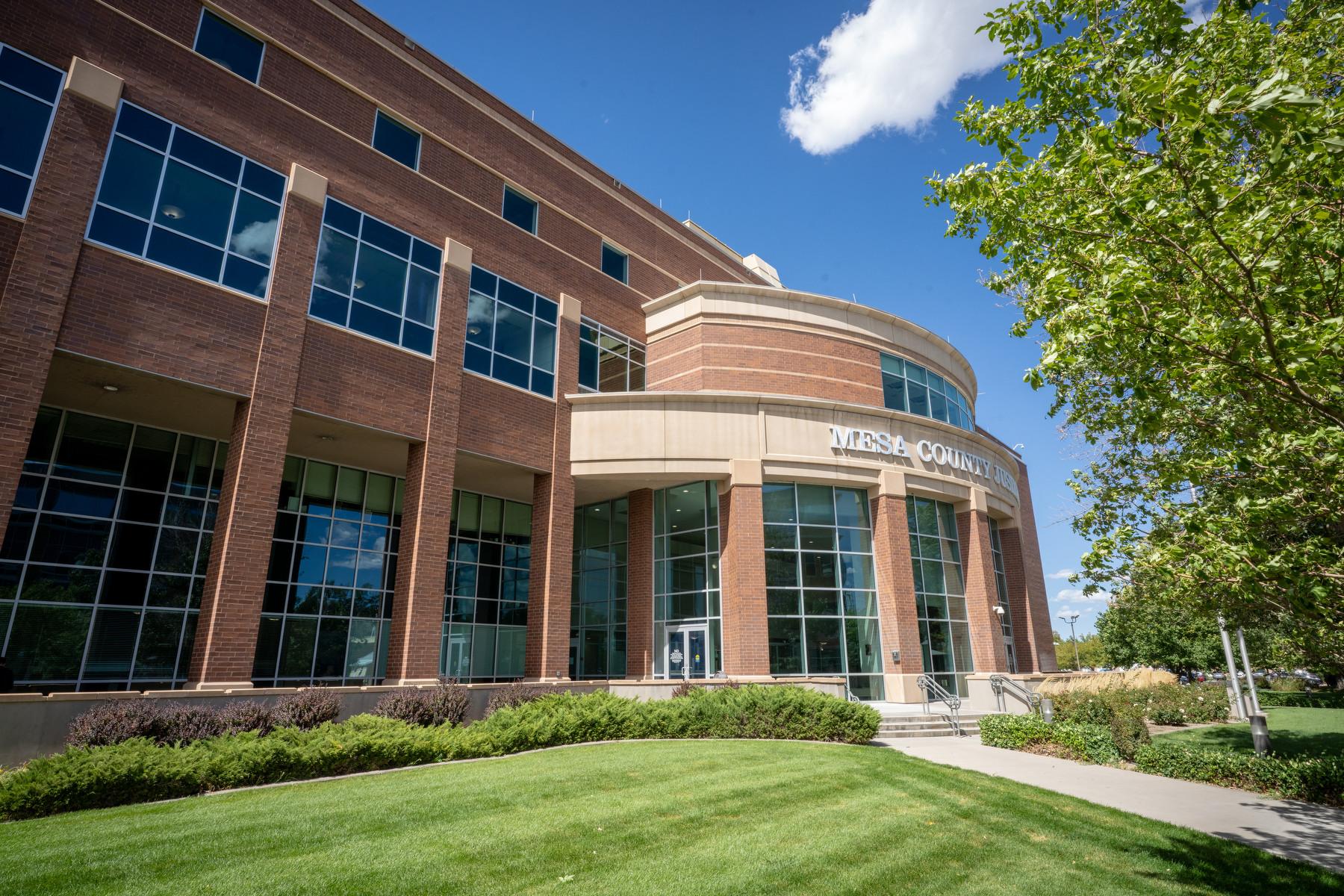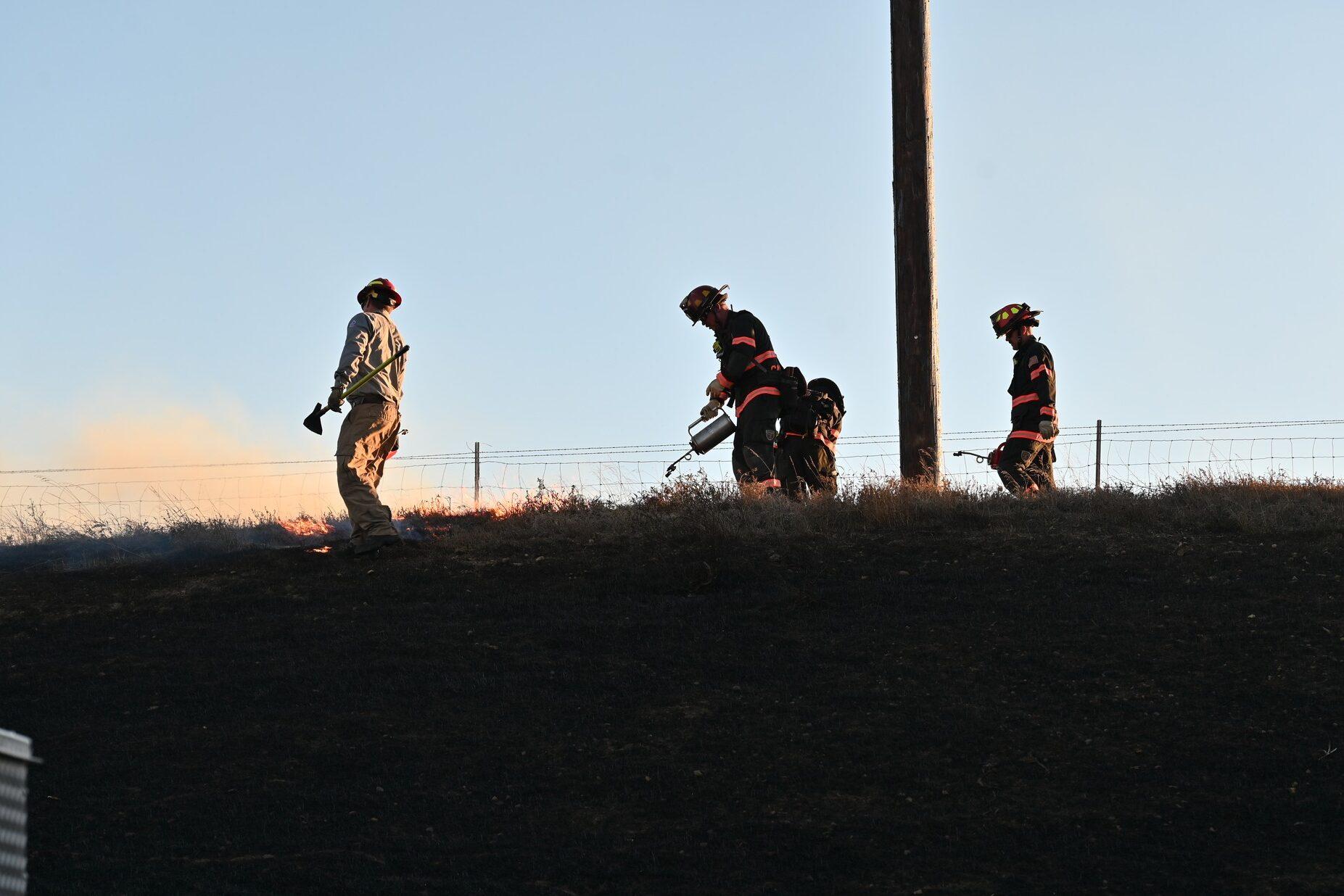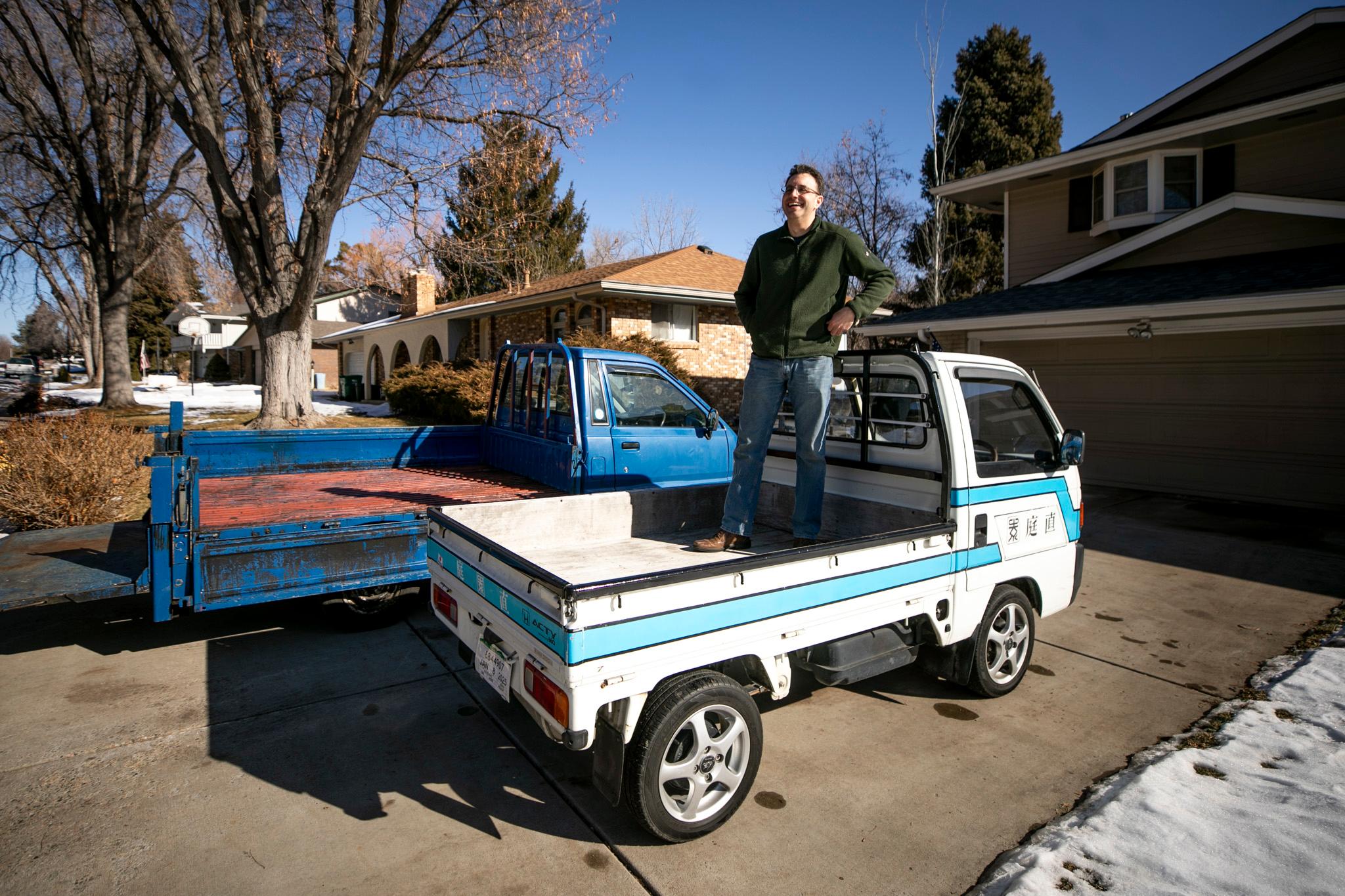
A bill that will soon be introduced at the Colorado legislature would allow Japanese mini vehicles on most of the state’s roads.
Kei cars and trucks, known as Kei-jidōsha, or light vehicles, in Japan where most of them are made, are growing in popularity in the U.S. But many states have banned them in recent years, categorizing them as off-road vehicles unfit for roads or citing safety concerns. U.S. buyers can import older kei vehicles that are exempt from federal emissions and safety rules for under $5,000.
Colorado’s Division of Motor Vehicles also tried to explicitly ban them last year, though it later pulled its proposed rule. Some kei vehicle owners, however, say the state is still trying to keep them off the road by refusing to allow them into the emissions testing process.
Now, proposed legislation could settle the issue of the tiny vehicles’ legality. One of the sponsors of the coming bill, Sen. Nick Hinrichsen, D-Pueblo, said kei trucks can be useful for farm work and in dense cities where space is tight.
“Where you need to parallel park, you need to get into narrow alleys, you need to get around traffic, hauling [construction] site stuff, but to be able to do so with a vehicle that's the size of a Mini Cooper instead of an F-150,” Hinrichsen said in an interview.
Hinrichsen and other advocates readily admit the micro vehicles, which have top speeds of around 60 miles per hour and can lack modern safety equipment like airbags, are not appropriate for the state’s interstates and other major highways. His bill would restrict them from such roads, he said.
“But there's absolutely no reason why they can't be safely operated on city streets or on farm roads [or] state highways where the speed limit's 55,” he said.
The bill already has the support of Gov. Jared Polis. A spokesperson said he is “excited to expand consumer choice to affordable vehicles and looks forward to supporting kei freedom.”
Kei vehicles, however, have historically faced opposition from law enforcement agencies, motor vehicle administrators, and auto dealers.
One Colorado kei truck owner’s kei truck journey started with a trip to Japan.
Ryan Albarelli, a Broomfield software engineer, grew up wanting a truck. But as an adult with kids and bills, he could never justify the staggeringly high cost of a typical huge modern North American pickup truck.
Then, on a trip to Japan, he noticed kei trucks and thought one of those might fit in the sweet spot between utility and thriftiness — brawny truck commercials be damned.
“It's the opposite of a large masculine truck. It is a small, as weak of vehicle as you could possibly imagine,” Albarelli said. “But it's a pickup truck and it's cool and people like it. So that enthusiasm is threatening to some people, I think, that sell vehicles.”
Albarelli eventually bought a 1990 Honda Acty once owned by a Japanese tree-trimming company and powered by a tiny 660cc engine. He has to squeeze a knee past the steering column and his head is just inches from the roof. The top speed capable of coming from the three-cylinder engine is about 55 mph.
But the bed is just about the same size as the standard 6.5-foot bed on a new F-150.
“You're not going to tow a camper with it,” Albarelli said “You're not going to haul an entire bed of gravel with it to landscape your house. But brush or anything you pick up at the Home Depot or any hardware store is going to work.”
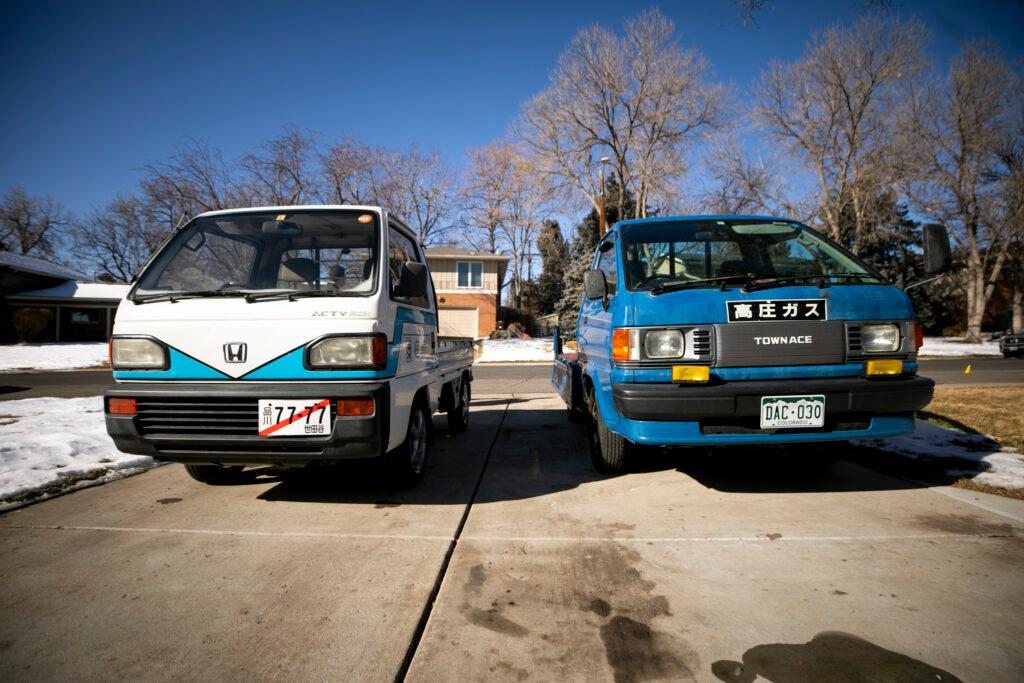
Parked next to Albarelli’s Honda was another Japanese truck — a 1995 Toyota Town Ace large enough that it doesn’t qualify as a kei truck but small enough to stand out in Colorado.
Albarelli was able to register and get permanent plates for the larger Toyota. The smaller Honda, though, is stuck in a bureaucratic doom loop. He said he got it titled through his county DMV office with no trouble. But his local emissions testing office has refused to test it, he said.
So Albarelli has revved up his advocacy work, publishing posts in a popular Facebook group and talking with bureaucrats and legislators. He even started a nonprofit, Colorado Kei Advocates, though he admits he hasn’t put much work into that yet. He hopes the legislature will legalize the vehicles so he won’t have to keep pressing people to let him drive it.
“I want to have a win-win situation,” he said. “I agree that we should have restrictions, but I also think that we should be allowing these vehicles.”
Some big players in the state and nationally have fought kei vehicles for years, though.
Colorado legislators have tried to legalize kei vehicles before. Failed bills were opposed by the Colorado Automobile Dealers Association and the Colorado State Patrol in 2015 and 2016.
Both groups declined to comment on the coming bill from Hinrichsen. But Tim Jackson, former president and CEO of the Colorado Automobile Dealers Association, said the arguments against legalizing kei vehicles at the state level boil down to two issues: pollution and safety.
“It does set up a two-tier system on both emissions and safety, and I think it contradicts everything that Colorado as a state has been trying to do,” Jackson said, referencing Colorado’s various efforts to improve road safety and clean up the state’s dirty air. Older kei trucks, including Albarelli’s Honda, lack modern systems like fuel injection that lower emissions.
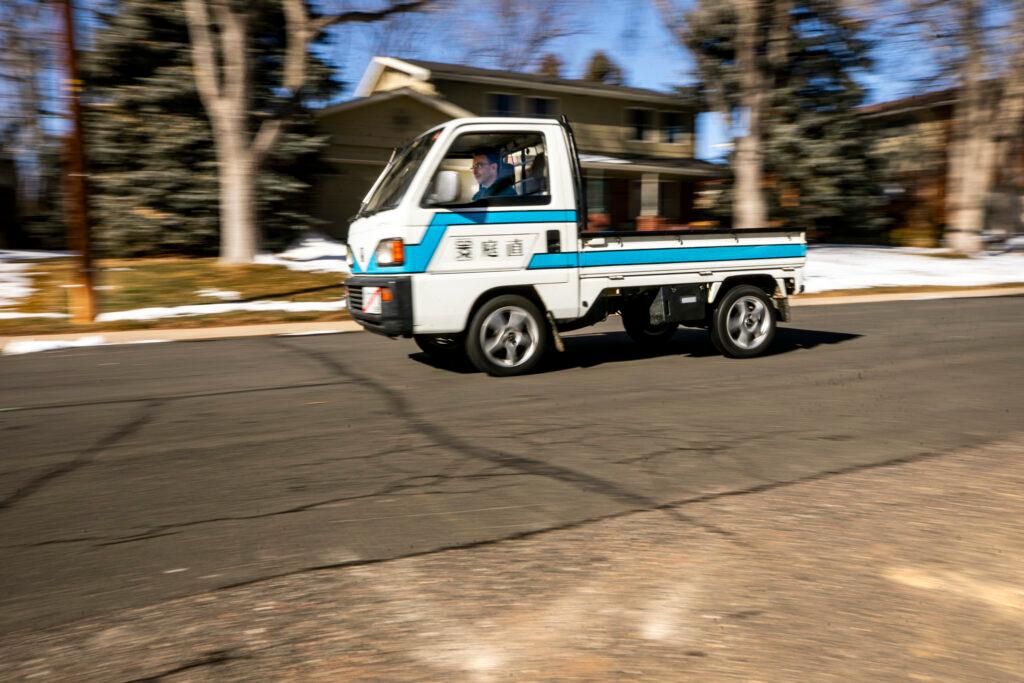
The American Association of Motor Vehicle Administrators, a national group that represents and lobbies for motor vehicle and law enforcement administrators, has fought kei vehicles across the country for years. The organization did not respond to multiple requests for comment. Two senior officials at the Colorado Division of Motor Vehicles and the State Patrol sit on the AAMVA’s regional board.
The Colorado DMV also declined an interview request. Asked why the DMV proposed and then pulled the rule explicitly banning kei trucks, spokeswoman Jennifer Giambi said in an email that the rule “aimed to clarify existing state laws regarding vehicle classifications to ensure consistency and better understanding.”
“Kei Vehicles have never been eligible for on-highway title and registration in Colorado,” Giambi wrote, adding that the rule was pulled because it “was already covered by existing statutes.”
Albarelli, however, disputes that existing state law explicitly bans kei vehicles, pointing out that he was able to get temporary plates for his Honda and only got hung up in the emissions testing process.
The state’s Air Pollution Control Division declined an interview request, saying it does not comment on proposed legislation. A spokesperson, however, said the division, “does not have an appropriate testing process for these kinds of vehicles.”
Josh Juhasz, president of Revhard Motors, a Denver-based dealership that specializes in Japanese models, said he’s imported a handful of kei vehicles for customers who’ve been able to successfully register them in counties where emissions tests aren’t required.
But, he said, state officials have made the emissions process a “brick wall” and so he’s discouraged potential customers from buying kei vehicles — at least for now.
“I don't see any reason why they shouldn't be legal,” he said.

